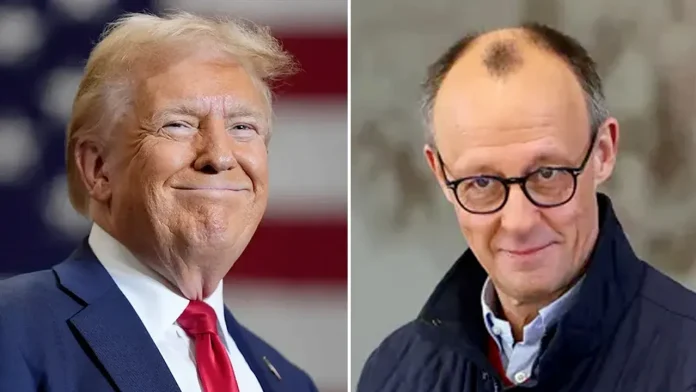In a significant political shift, Germany’s recent national election has propelled the conservative Christian Democratic Union (CDU) back into power, with Friedrich Merz poised to become the next chancellor. The election also witnessed a historic surge by the far-right Alternative for Germany (AfD), which doubled its previous vote share to become the second-largest party in the Bundestag. This conservative wave has garnered international attention, notably from U.S. President Donald Trump, who hailed the results as a triumph of common sense over long standing policies.
A Conservative Resurgence
The CDU, in alliance with its Bavarian sister party, the Christian Social Union (CSU), secured approximately 28.5% of the vote. This victory marks a return to prominence for the conservatives after a period of political turbulence and economic challenges under the previous coalition government led by Chancellor Olaf Scholz. Merz, a seasoned politician known for his fiscal conservatism and pro-business stance, has pledged to address Germany’s economic stagnation and implement stricter immigration controls.
The far-right AfD achieved a remarkable 20% of the vote, doubling its support since the last election. This performance underscores a growing segment of the electorate gravitating towards nationalist and anti-immigration platforms. Despite their electoral gains, mainstream parties, including the CDU/CSU, have ruled out forming coalitions with the AfD, citing fundamental ideological differences.
Trump’s Endorsement
President Donald Trump took to his social media platform, Truth Social, to commend the German election outcomes. In a characteristically emphatic post, he stated:
“Looks like the conservative party in Germany has won the very big and highly anticipated election. Much like the USA, the people of Germany got tired of the no common sense agenda, especially on energy and immigration, that has prevailed for so many years.”
Trump’s remarks reflect his administration’s alignment with policies favoring stricter immigration controls and a reevaluation of energy strategies, mirroring the sentiments that influenced the German electorate. His congratulatory message also emphasized the perceived shared ideological shift between the U.S. and Germany, suggesting a strengthening of transatlantic relations under conservative leadership.
Economic and Political Implications
The election results have already begun to influence economic indicators. The euro experienced an uptick, reaching as high as $1.05 in early trading, reflecting investor optimism about potential fiscal reforms and increased government spending under the new conservative leadership. Stock futures also showed volatility, with EUROSTOXX 50 futures rising by 0.07% and DAX futures by 0.24%. Analysts are closely monitoring the formation of the new government, particularly any changes to Germany’s “debt brake” policy, which could signal shifts in budgetary and economic strategies. citeturn0news25
Friedrich Merz has expressed his intention to form a coalition government by Easter. However, the path to a stable coalition is complex, given the CDU/CSU’s need to partner with other parties to achieve a parliamentary majority. Potential coalition partners include the center-left Social Democrats (SPD), despite their significant electoral losses, and the Greens. The Free Democrats (FDP), who previously played a role in the collapse of Scholz’s government, are also a consideration, though their parliamentary presence remains uncertain due to their narrow margin around the 5% threshold required for representation.
Challenges Ahead
The incoming government faces a myriad of challenges. Germany’s economy has been grappling with prolonged stagnation, and there is public pressure to implement policies that stimulate growth and address unemployment. Immigration remains a contentious issue, with debates over border control and integration policies intensifying during the campaign. Additionally, Germany’s role in international affairs, particularly concerning the ongoing situation in Ukraine and relations with both the United States and Russia, will require careful navigation.
The AfD’s unprecedented success adds another layer of complexity. Their increased representation in the Bundestag signifies a shift in the political landscape, challenging traditional parties to address the concerns of voters who feel disenfranchised. While the AfD remains excluded from potential coalitions, their influence in parliamentary debates and committees is expected to grow.
A New Chapter in Transatlantic Relations
President Trump’s enthusiastic response to the German election results indicates a potential realignment of U.S.-Germany relations. With both nations under conservative leadership, there may be increased collaboration on issues such as defense spending, trade policies, and a unified approach to global challenges. However, this alignment also raises questions about the future of multilateral agreements and Europe’s strategic autonomy in the face of shifting U.S. foreign policies.
As Germany embarks on this new political chapter, the formation of a stable and effective government remains paramount. The choices made in the coming weeks will not only shape the nation’s domestic trajectory but also influence its role on the global stage.
For more such updates follow Swadesi!




